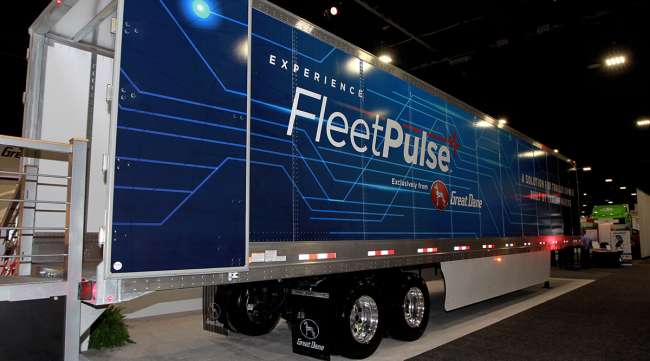Staff Reporter
Fleets Grapple With Question: How Many Subscriptions Do We Need?

[Stay on top of transportation news: Get TTNews in your inbox.]
Trucking executives are increasingly confronting the same proliferation of decisions that vex consumers who are shopping for online video services — to subscribe or not to subscribe?
Just as streaming television and movie services such as Netflix and Hulu offer new customers free trials, so, too, are technology vendors that are competing in an increasingly crowded marketplace for fleets’ business. For example, Savannah, Ga.-based trailer manufacturer Great Dane at the North American Commercial Vehicle Show last month said that it would waive subscription fees for the first three years for its new FleetPulse trailer telematics system. And they’re not alone; other vendors made similar offers at the show for various digital-tracking or smart technology services, although in some cases, the free subscriptions came only after the purchase of hardware.

Legler
To be sure, subscriptions for trucking technology services are common. They often are offered for services attachable to trucks or trailers, like GPS tracking, video and cargo monitoring. But it seems that fleets are confronting a future where they may be managing multiple subscriptions, and, eventually, facing tough decisions about which services they really need.
“We are going through an evolution on this,” said Jack Legler, technical director of American Trucking Associations’ Technology & Maintenance Council, who noted that trucking firms are enticed by technologies that promise to improve reliability while providing a return on investment.
“It’s proliferating. We are not even to the peak yet.”

Stegall
Wally Stegall, a technical fellow and director of business development at Morey Corp., said this trend cannot last.
“Multiple subscriptions need to go away,” said Stegall, who serves on the Future Truck Committee of the Technology & Maintenance Council of American Trucking Associations. “That’s not maintainable.”
Great Dane Director of Business Development Mike Molitor told Transport Topics on Nov. 14 that while fleets are “certainly expressing some fatigue with respect to the number of subscription-based software offerings in the marketplace,” he noted that fleets must consider the underlying value of any subscription-based product or service.
“Our focus is on delivering a smart trailer that solves the problems of fleets with actual outcomes, and sharing in that value creation does not mandate a subscription model for us,” Molitor said in an email. “There are analogies to the streaming services [Netflix, Hulu, AppleTV+, Disney+, etc.] in that ‘content is king.’ The real value resides in offering access to good content [in our case, reliable trailer data].”
Norm Thomas, general manager of the transport and logistics segment for Woodcliff Lake, N.J.-based tracking services provider PowerFleet, said subscription fatigue is leading some companies to tout one-stop shopping for electronic logging devices, video and trailer-tracking. The company sells data sensors for a variety of services that can be attached to a single subscription with the purchase of hardware, Thomas said. He noted that a common fleet complaint about managing data across multiple subscriptions is the data are divided.
“Our goal and vision is to be end to end,” he said.

Thomas
Thomas said a typical PowerFleet subscription starts at $30 a month for the truck and trailer and increases for more premium services. He said hardware for a tractor can range from $575 to $625 per unit, while trailer hardware can range from $275 to $350 per unit.
“Most fleets don’t want multiple data providers,” Thomas added. “We hear that quite a bit.”
One potential remedy to multiple subscriptions that Stegall supports is a universal communications port for data and digital services that could accept data from sensors on trucks and trailers, thus reducing the number of communication connections. That said, firm statistics on how many subscriptions an average North American fleet truck has are not readily available in the industry. Clem Driscoll, founder and principal of research agency C.J. Driscoll and Associates of Palos Verdes Estates, Calif., noted that since most fleet trucks have GPS tracking, a high percentage of trucks already are attached to subscriptions. And he expects that fleet demand for integration of services will grow but questions if carriers will spend the money for all of the myriad services available, if only for economic reasons. “There’s definitely price sensitivity,” Driscoll said.
Stegall agreed that the industry will at some point likely reach a breaking point. “The world is not going to down the path of having multiple subscriptions,” he said. “It’s going to hit the economic wall.”
Want more news? Listen to today's daily briefing:




